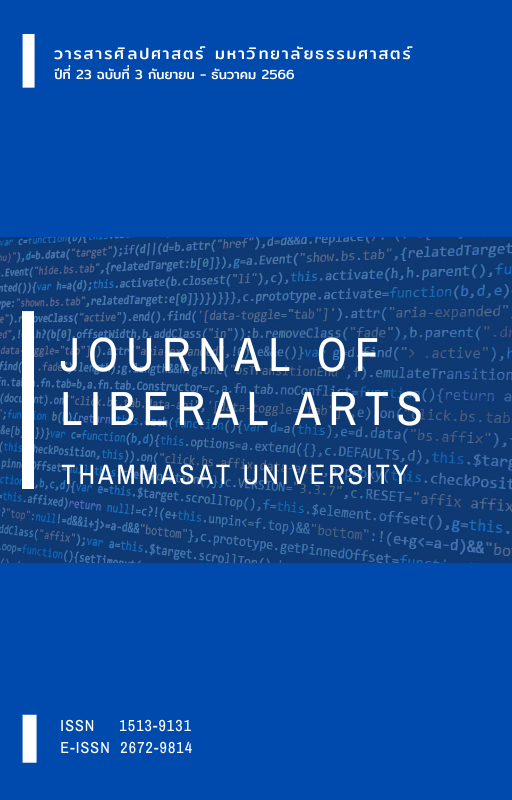“สอนเด็กให้เป็นคนดี” มายาคติคุณธรรมในโรงเรียนไทย
Main Article Content
บทคัดย่อ
ปัจจุบันโรงเรียนสอนให้นักเรียนเป็นคนดีผ่านโครงการคุณธรรมตามกรอบที่สำนักงานคณะกรรมการการศึกษาขั้นพื้นฐาน (สพฐ.) กำหนด งานวิจัยนี้มีวัตถุประสงค์เพื่อศึกษามายาคติคุณธรรมในโรงเรียนไทย โดยใช้การวิเคราะห์วาทกรรมเชิงวิพากษ์ เก็บข้อมูลจากการวิเคราะห์เอกสารโครงการโรงเรียนคุณธรรม สพฐ. สนทนากลุ่มครูและผู้บริหารโรงเรียนต้นแบบที่มีการสอนคุณธรรม 12 โรงเรียน ศึกษากรณีศึกษาจำนวน 5 โรงเรียน และวิเคราะห์ข้อมูลที่เป็นแก่นสาระของวาทกรรมและปฏิบัติการทางวาทกรรม ผลการวิจัยพบว่า มายาคติคุณธรรมที่แฝงฝังในโรงเรียนไทย คือ มายาคตินักเรียนดี 3 ประการ 1) นักเรียนดีต้องไม่มีพฤติกรรมปัญหา ครูจึงต้องกดปัญหาไว้ให้มีน้อยลงและเพิ่มพฤติกรรมความดีให้ได้มากที่สุดโดยให้นักเรียนทำโครงงานคุณธรรม 2) นักเรียนดีต้องทำกิจกรรมทางศาสนา เป็นมายาคติที่เชื่อว่าความดีงามอยู่ในวิถีปฏิบัติของศาสนา การที่นักเรียนไหว้พระ ทำสมาธิ สวดมนต์ เหล่านี้คือการทำดี 3) นักเรียนดีต้องปฏิบัติตัวเหมือนคนดีต้นแบบ ใช้กิจกรรมยกย่องเชิดชูเกียรติคนต้นแบบเป็นกลยุทธ์ในการสอน ความดีจึงไม่อาจเริ่มจากการเรียนรู้ปัญหาของนักเรียนเอง มายาคติเหล่านี้ขับเคลื่อนด้วยกลไกปฏิบัติการวาทกรรมสร้างนักเรียนดี ในคู่มือโครงการโรงเรียนคุณธรรม สพฐ. ภายใต้การประเมินผลโรงเรียนดีติดดาว และการศึกษาคุณธรรมที่ยึดโยงกับรัฐชาติ เป็นกลไกสั่งการจากบนลงล่างจนละเลยปัจจัยด้านชุมชนซึ่งมีบริบททางสังคมวัฒนธรรมที่เป็นการดำรงอยู่ของผู้คนในแต่ละพื้นถิ่น การจัดการศึกษาเพื่อสอนคุณธรรมจึงควรเปิดพื้นที่ให้ชุมชนได้เป็นเจ้าของในการกำหนดคุณธรรมอัตลักษณ์ของตนเอง
Downloads
Article Details

อนุญาตภายใต้เงื่อนไข Creative Commons Attribution-NonCommercial-NoDerivatives 4.0 International License.
เอกสารอ้างอิง
กระทรวงศึกษาธิการ. (2562). ประกาศกระทรวงศึกษาธิการ เรื่องกรอบแนวทางการดำเนินงานสถานศึกษาคุณธรรม กระทรวงศึกษาธิการ และประกาศกระทรวงศึกษาธิการ เรื่องยุทธศาสตร์สถานศึกษาคุณธรรม กระทรวงศึกษาธิการ. http://obec-nayok.com/news-detail_1274_25024
กระทรวงการพัฒนาสังคมและความมั่นคงของมนุษย์, กรมกิจการเด็กและเยาวชน. (2563). รายงานการพัฒนาเด็กและเยาวชน ประจำปี 2563. ม.ป.พ.
ณัฐพร ส่งศรี. (2561). การบริหารจัดการโรงเรียนคุณธรรมของโรงเรียนกลุ่มเครือข่ายบ้านโป่งที่ 3. [สารนิพนธ์ปริญญามหาบัณฑิต, มหาวิทยาลัยศิลปากร]. มหาวิทยาลัยศิลปากร.
ธนสาร บัลลังก์ปัทมา. (2563). รูปแบบบริหารงานโรงเรียนคุณธรรมของผู้บริหารสถานศึกษา สังกัดสำนักงานเขตพื้นที่การศึกษาประถมศึกษา. [วิทยานิพนธ์ปริญญาดุษฎีบัณฑิต]. มหาวิทยาลัยมหามกุฏราชวิทยาลัย.
นวลจันทร์ จุฑาภักดีกุล. (2563). รายงานวิจัยโครงการวิจัยประเมินผลการเรียนรู้ในโครงการสร้างพลเมืองที่มีความรับผิดชอบต่อสังคม (Active citizen) ต่อทักษะการคิดเชิงบริหารและการกำกับตัวเองไปสู่เป้าหมายของวัยรุ่น. มหาวิทยาลัยมหิดล, สถาบันชีววิทยาโมเลกุล.
รับขวัญ ธรรมบุตรดี. (2564). “นักเรียนเลว” และการรื้อเรื่องเล่าของผู้ถูกกดทับ: การทวงคืนเรื่องเล่าของภาษา พื้นที่ และร่างกาย ของกลุ่มนักเรียนมัธยมศึกษาไทยในปี พ.ศ. 2563. วารสารศิลปวัฒนธรรมสวนสุนันทา สำนักศิลปะและวัฒนธรรม มหาวิทยาลัยราชภัฏสวนสุนันทา, 1(1/2564), 87-107.
โรงเรียนไทรโยคน้อยวิทยา. (2563). รายงานผลการดำเนินการกิจกรรมตามโครงการโรงเรียนคุณธรรม สพฐ.(กิจกรรมโรงเรียนดีต้องมีที่ยืน) ระดับดาวดวงที่ 3 ปีการศึกษา 2563. http://www.syn.ac.th/smss/modules/cabinet/upload_files/37098002478641631600283.pdf
โรงเรียนพญาไท. (2560). รายงานการดำเนินกิจกรรมโครงการโรงเรียนคุณธรรม สพฐ. โรงเรียนพญาไท ปีงบประมาณ 2560. https://www.phyathai.ac.th/images/pdfs/2561/moralschool60.pdf
สำนักงานคณะกรรมการการศึกษาขั้นพื้นฐาน. (2560). แนวทางการขับเคลื่อนการดำเนินงานตามโครงการโรงเรียนคุณธรรม สพฐ. ประจำปีงบประมาณ 2561. http://www.secondary5.go.th/main/html/moralschools/14.pdf
สํานักงานคณะกรรมการการศึกษาขั้นพื้นฐาน, สํานักพัฒนานวัตกรรมการจัดการศึกษา. (ม.ป.ป.). โรงเรียนคุณธรรม สพฐ. โรงเรียนดีต้องมีที่ยืน. สืบค้นเมื่อวันที่ 20 มีนาคม 2565, จาก http://www.thaischool.in.th/_files_school/14101051/data/14101051_1_20180821-103306.pdf
สำนักงานศึกษาธิการจังหวัดนนทบุรี. (2562). การถอดบทเรียนกระบวนการพัฒนาโรงเรียนคุณธรรม “โรงเรียนคุณธรรมนนบุรี เทิดไท้องค์ราชัน”. http://110.78.114.132/sec6/main/datanew/wijai.pdf
สํานักพัฒนานวัตกรรมการจัดการศึกษา สํานักงานคณะกรรมการการศึกษาขั้นพื้นฐาน. (ม.ป.ป.). โรงเรียนคุณธรรม สพฐ. การนิเทศ กำกับ ติดตาม. สืบค้นเมื่อวันที่ 20 มีนาคม 2565, จาก http://www.thaischool.in.th/_files_school/14101051/data/14101051_1_20180821-103343.pdf
เอกศักดิ์ ยุกตะนันท์. (2560, 8 กรกฎาคม). จรรยาปัญญา (1) เอกศักดิ์ ยุกตะนันท์ นิยามศีลธรรมและคำถามจากนักปรัชญา. ประชาไท. https://prachatai.com/journal/2017/07/72313
Arthur, J., Kristjansson, K., Harrison, T., Sanderse, W., & Wright, D. (2017). Teaching character and virtue in schools. Routledge.
Bleazby, J. (2019). Fostering moral understanding, moral inquiry & moral habits through philosophy in schools: A Deweyian analysis of Australia’s ethical understanding curriculum. Journal of Curriculum Studies, 52(1), 84-100. https://doi.org/10.1080/00220272.2019.1650116
Boocock, S. S. (1978). The social organization of the classroom. Annual Review of Sociology, 4, 1-28. https://doi.org/10.1146/annurev.so.04.080178.000245
Bourdieu, P. (1986). The forms of capital. In J. Richardson (Ed.), Handbook of theory and research for the sociology of education (pp. 241-258). Greenwood.
Braun, V., & Clarke, V. (2012). Thematic analysis. In H. Cooper, P. M. Camic, D. L. Long, A. T. Panter, D. Rindskopf, & K. J. Sher (Eds.), APA handbook of research methods in psychology, Vol. 2: Research designs: Quantitative, qualitative, neuropsychological, and biological (pp. 57-71). American Psychological Association.
Brown, B. (2010). The gifts of imperfection: Let go of who you think you’re supposed to be and embrace who you are. Hazelden Publishing.
Cushman, F., Kumar, V., & Railton, P. (2017). Moral learning: Psychological and philosophical perspectives. Cognition, 167, 1-10. https://doi.org/10.1016/j.cognition.2017.06.008
Dreeben, R. (1970). The nature of teaching: Schools and the work of teachers. Scott, Foresman, and Co.
Dreeben, R. (1973). The school as a workplace. Bidwell.
Fairclough, N. (2013). Critical discourse analysis: The critical study of language. Routledge.
Fox, A. (2012). Teaching kids to be good people: progressive parenting for the 21st century. Electric Eggplant.
Jackson, P. W. (1971). The difference teachers make. In How teachers make a difference (pp. 21-31). US Gov. Print. Off.
Kristjánsson, K. (2010). The self and its emotions. Cambridge University Press.
Kristjánsson, K. (2013). Ten myths about character, virtue, and virtue education – plus three well-founded misgivings. British Journal of Educational Studies, 61(3), 269-287. https://doi.org/10.1080/00071005.2013.778386
Leriche, L. (1992). The sociology of classroom discipline. The High School Journal, 75(2), 77-89.
Liu, X. (2014). The problem of character education and Kohlberg’s moral education: Critique from Dewey’s moral deliberation. Philosophical Studies in Education, 45, 136-145.
Lortie, D. C. (1975). Schoolteacher: A sociological study. Univ. Chicago Press.
Peterson, C., & Seligman, M. E. P. (2004). Character strengths and virtues a handbook and Classification. Oxford University Press.
Powell, P. A., & Roberts, J. (2017). Situational determinants of cognitive, affective, and compassionate empathy in naturalistic digital interactions. Computers in Human Behavior, 68, 137–148. https://doi.org/10.1016/j.chb.2016.11.024
Rhodes, M., & Wellman, H. (2016). Moral learning as intuitive theory revision. Cognition, 167, 191-200. https://doi.org/10.1016/j.cognition.2016.08.013
Richardson, G. J. (1986). Handbook of theory and research for the sociology of education. Greenwood Press.
Saalfield, P. (2014, March 3). The biology of right and wrong. Harvard Magazine. https://www.harvardmagazine.com/2012/01/the-biology-of-right-and-wrong
Urciuoli, B. (2014). The semiotic production of the good student: A Peircean look at the commodification of liberal arts education. Signs and Society, 2(1), 56-83. https://doi.org/10.1086/675537
Way, M. S. (2011). School discipline and disruptive classroom behavior: The moderating effects of student perceptions. The Sociological Quarterly, 52(3), 346-375. http//www.jstor.org/stable/23027541


